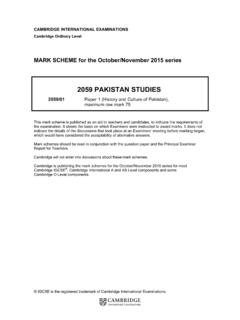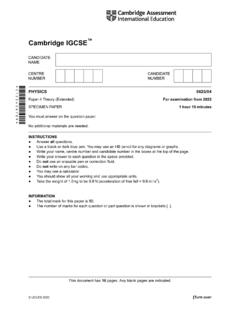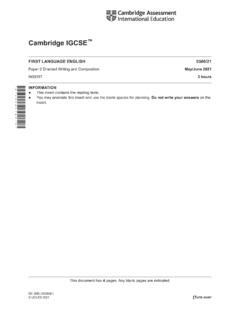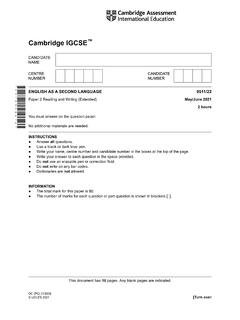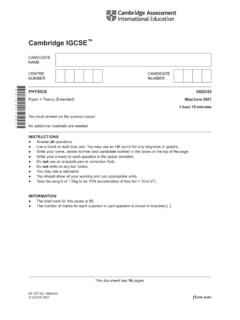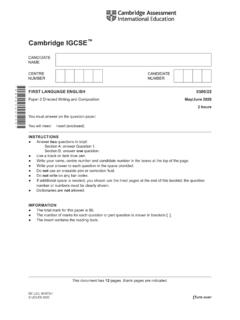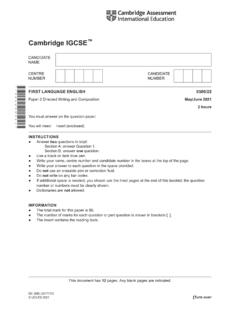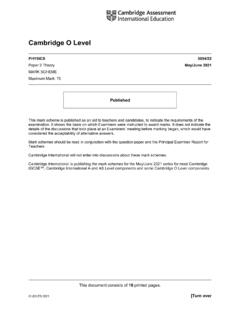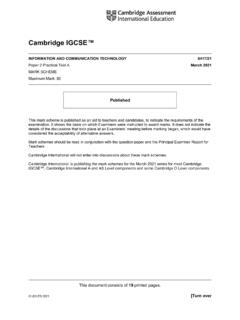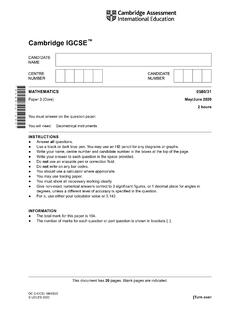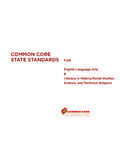Transcription of Specimen Paper Answers - Past Papers
1 Specimen Paper Answers Paper 1. Cambridge IGCSE . First Language English 0500. For examination from 2020. Version 2. In order to help us develop the highest quality resources, we are undertaking a continuous programme of review; not only to measure the success of our resources but also to highlight areas for improvement and to identify new development needs. We invite you to complete our survey by visiting the website below. Your comments on the quality and relevance of our resources are very important to us. Would you like to become a Cambridge consultant and help us develop support materials? Please follow the link below to register your interest. Copyright UCLES 2018. Cambridge Assessment International Education is part of the Cambridge Assessment Group. Cambridge Assessment is the brand name of the University of Cambridge Local Examinations Syndicate (UCLES), which itself is a department of the University of Cambridge. UCLES retains the copyright on all its publications.
2 Registered Centres are permitted to copy material from this booklet for their own internal use. However, we cannot give permission to Centres to photocopy any material that is acknowledged to a third party, even for internal use within a Centre. Contents Contents .. 3. Introduction .. 4. Assessment overview .. 5. Question 1 .. 7. Question 2 .. 10. Question 3 .. 13. Appendix: Specimen Paper 1 mark 15. Specimen Paper Answers Paper 1. Introduction The aim of this booklet is to exemplify standards for those teaching Cambridge IGCSE First Language English 0500, and to show examples of good Answers for Specimen Paper 1. Each answer is followed by a commentary written by a Cambridge examiner, explaining the strengths and weaknesses of the Answers . These examiner comments indicate why marks were awarded and how Answers could be improved Specimen Paper 1, the mark scheme and insert are available to download from the School Support Hub. These files are: 2020 Specimen Paper 1.
3 2020 Specimen Paper 1 Mark Scheme 2020 Specimen Paper Insert past exam resources and other teacher support materials are available on the School Support Hub Changes to Paper 1 Reading (for examination from 2020). The changes which have been made to the 2020 Cambridge IGCSE First Language English 0500 syllabus matches the examination approach to Reading with the examination approach to Writing. From 2020 there is just one untiered Reading examination ( Paper 1) which is open to both Core and Extended candidates to correspond with the one untiered Paper 2 Writing, and Component 3 Coursework Portfolio. The revised 2020 Reading Paper blends familiar tasks and approaches from the legacy Core and Extended Reading examinations to allow all candidates to access the full range of grades for the qualification (from A* G). The examination tests the same knowledge and Reading skills as previously, using clearly defined assessment objectives. The number of marks available in the examination has been increased to 80 to allow candidates to show more precisely what they can do and to allow for more effective differentiation.
4 The questions will be based on three texts which will be provided in an insert. Question 1 and Question 2 will have part questions. The mark scheme details the assessment objective(s) targeted in each task and makes explicit the evidence of skills and understanding that candidates need to demonstrate. Though primarily a test of Reading, 15 of the available 80 marks in Paper 1 are for Writing, split between the selective summary in Question 1 (5 marks) and Question 3, the response to reading (10 marks). Both of these tasks now assess accuracy of spelling, punctuation and grammar. There has been no change to the general marking principles. These must still be applied by all examiners when marking candidates' Answers , alongside the specific content of the mark scheme and/or generic level descriptors for a question. For example, marks continue to be awarded positively and not deducted for omissions or errors marks are awarded when candidates clearly demonstrate what they know and can do.
5 See the Appendix in this document for some further comments and guidance about the mark scheme for Specimen Paper 1. 4 Cambridge IGCSE First Language English 0500. Specimen Paper Answers Paper 1. Assessment overview All candidates take two Papers : Paper 1 and either Paper 2 or Component 3. Component 4 is optional and assesses speaking and listening skills. This component is separately endorsed and marks will not contribute to a candidate's overall grade . All candidates take: And: Paper 1 Reading Paper 2 Directed Writing and Composition 2 hours 2 hours 80 marks 80 marks Structured and extended writing questions Extended writing question and a composition task Questions will be based on three reading texts Externally assessed Externally assessed Or: Component 3 Coursework Portfolio 80 marks Three extended writing assignments Internally assessed and externally moderated Centres may also choose to enter candidates for the Speaking and Listening Test.
6 Marks for this optional component do not contribute to the overall grade candidates receive for the written components. Where candidates perform to an appropriate standard, certificates record achievement of grades 1 (high) to 5 (low). Candidates can also take: Component 4 Speaking and Listening Test Approx. 10 12 minutes 40 marks Separately endorsed Individual Talk and Conversation Internally assessed and externally moderated The syllabus for Cambridge IGCSE First Language English 0500 is available at Cambridge IGCSE First Language English 0500 5. Specimen Paper Answers Paper 1. Assessment objectives The assessment objectives (AOs) are: AO1 Reading Candidates will be assessed on their ability to: R1 demonstrate understanding of explicit meanings R2 demonstrate understanding of implicit meanings and attitudes R3 analyse, evaluate and develop facts, ideas and opinions, using appropriate support from the text R4 demonstrate understanding of how writers achieve effects and influence readers R5 select and use information for specific purposes.
7 AO2 Writing Candidates will be assessed on their ability to: W1 articulate experience and express what is thought, felt and imagined W2 organise and structure ideas and opinions for deliberate effect W3 use a range of vocabulary and sentence structures appropriate to context W4 use register appropriate to context W5 make accurate use of spelling, punctuation and grammar. AO3 Speaking and listening Candidates will be assessed on their ability to: SL1 articulate experience and express what is thought, felt and imagined SL2 present facts, ideas and opinions in a cohesive order which sustains the audience's interest SL3 communicate clearly and purposefully using fluent language SL4 use register appropriate to context SL5 listen and respond appropriately in conversation. Weighting for assessment objectives The approximate weightings allocated to each of the assessment objectives (AOs) are summarised below. Assessment objective weighting in IGCSE.
8 Assessment objectives Weighting AO1 Reading 50%. AO2 Writing 50%. AO3 Speaking and listening Separately endorsed Assessment objective weighting in components Paper 2 and Assessment objectives Paper 1 Component 4. Component 3. AO1 Reading 80% 20%. AO2 Writing 20% 80%. AO3 Speaking and 100%. listening 6 Cambridge IGCSE First Language English 0500. Specimen Paper Answers Paper 1. Question 1. Question 1(a e). Read Text A, Project Mammoth, in the insert and then answer Questions 1 (a) (e) on this question Paper . Specimen Answers Question 1. (a) Give two examples of extinct species (other than the mammoth) according to the text. dodo passenger pigeon [1]. (b) Using your own words, explain what the text means by: (i) candidates for de-extinction (line 2): species of already extinct animals they could choose to bring back . [2]. (ii) not just distant dreams.' (line 5): not out of our reach or impossible, could possibly happen and become reality soon.
9 [2]. (c) Re-read paragraph 3, ( Scientists working on such projects climate change.'). Give two reasons why scientists might be excited by the possible birth of a woolly mammoth. They disappeared around 4000 years ago The mammoths could play a role in reversing climate change [2]. (d) Re-read paragraphs 4 and 5, ( The basic idea Siberia's permafrost.'). (i) Identify two main tasks that scientists will need to complete in order to breed the hybrid. Retrieve perserved DNA from the remains of the mammoth Use the woolly mammoth DNA to alter the DNA of Asian elephants [2]. (ii) Explain why Asian elephants were chosen for Project Mammoth.. Asian elephants are closely related to mammoths and could possibly interbreed. Secondly the elephants could be more resistant to cold and repopulate areas of Eurasia and North America, helping conserve Asian Elephant. Lastly by repopulating these areas it could revive ancient grasslands and prevent the melting of Siberia's permafrost.
10 [3]. Cambridge IGCSE First Language English 0500 7. Specimen Paper Answers Paper 1. (e) Re-read paragraphs 6 and 7, ( The project is not without chance of survival.'). Using your own words, explain why some people disagree with Project Mammoth. People who disagree believe that the project is just a novelty, giving those involved the false opinion that they are helping the planet when really they are risking species diversity with claims that we can solve this in the future .. [3]. Examiner comments Question 1 (a). Both are examples of extinct species given in the text other than the mammoth. Mark awarded = 1 out of 1. Question 1 (b)(i). The candidate covers both strands of the answer, offering a full explanation in their own words. Mark awarded = 2 out of 2. Question 1 (b)(ii). The candidate covers both strands of the answer, offering a full explanation in their own words. Mark awarded = 2 out of 2. Question 1 (c). They' in the first part of the candidate's response is clearly referring to mammoths in answer to the question and so can be credited.
